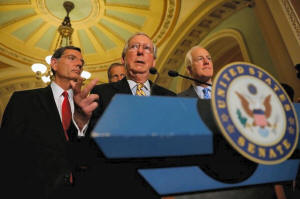|
Senate poised for healthcare showdown
 Send a link to a friend
Send a link to a friend
 [July 27, 2017]
By Amanda Becker and Yasmeen Abutaleb [July 27, 2017]
By Amanda Becker and Yasmeen Abutaleb
WASHINGTON (Reuters) - U.S. Senate
Republicans begin their final push on Thursday to unravel Obamacare,
seeking to wrap up their seven-year offensive against former Democratic
President Barack Obama's signature healthcare law that extended
insurance coverage to millions.
Republicans leaders hope a pared-down "skinny" bill that repeals several
key Obamacare provisions can gain enough support to pass after several
attempts at broader legislation failed to win approval earlier this
week.
The skinny bill's details will be released at some point on Thursday,
before the Senate embarks on a marathon voting session that could extend
into Friday morning. The legislation is expected to eliminate mandates
requiring individuals and employers to obtain or provide health
insurance, and abolish a tax on medical device manufacturers.
The effort comes after a chaotic two-month push by Senate Republicans to
pass their version of legislation that made it out of the
Republican-controlled House of Representatives in May.
Members of the party, including President Donald Trump, campaigned on a
pledge to repeal and replace what they say is a failing law that allows
the government to intrude in people's healthcare decisions.

Republicans were optimistic about the skinny bill's chances of receiving
at least 50 votes in the Senate where they hold a 52-48 majority.
Senator John Cornyn, the chamber's No. 2 Republican, said the bill, once
approved, would go to a special negotiating committee of lawmakers from
both chambers that would reconcile the House and Senate versions into a
single piece of legislation.
Republican leaders had tapped a group to craft legislation largely
behind closed doors, exposing rifts within the party. While
conservatives said the group's proposals did not go far enough,
moderates said they could not support measures estimated to deprive tens
of millions of health insurance.
The Senate voted 55-45 on Wednesday against a simple repeal of
Obamacare, which would have provided a two-year delay so Congress could
work out a replacement. Seven Republicans opposed the bill. On Tuesday,
senators rejected the repeal-and-replace plan Republicans had been
working on since May.
[to top of second column] |

Senate Majority Leader Mitch McConnell, accompanied by Senator John
Cornyn (R-TX) and Senator John Barrasso (R-WY), speaks with
reporters following the successful vote to open debate on a health
care bill on Capitol Hill in Washington, U.S., July 25, 2017.
REUTERS/Aaron P. Bernstein

Senate Majority Leader Mitch McConnell can lose only two Republican
votes to pass healthcare legislation. Even then, he would have to
call on Vice President Mike Pence to cast a tie-breaking vote as
head of the Senate. Democrats are united in opposition.
GOVERNORS SEEK INVOLVEMENT
A bipartisan group of 10 governors urged senators in a letter on
Wednesday to start over and use a drafting process that includes
governors from both parties. Governors of Nevada, Ohio, Louisiana,
Pennsylvania and Colorado were among those who signed the letter,
all of whose states have Republican senators.
The Congressional Budget Office, a nonpartisan research agency,
estimated on Wednesday that a combination of provisions that might
go into the skinny bill would lead to 16 million people losing their
health coverage by 2026.
It had earlier estimated that the two other bills rejected by the
Senate this week would have led to 22 million to 32 million people
losing their health insurance by 2026.
Senate Democratic leader Chuck Schumer criticized Republican leaders
for crafting a "yet-to-be-disclosed final bill" in secret.
"We don't know if skinny repeal is going to be their final bill, but
if it is, the CBO says it would cause costs to go up, and millions
to lose insurance," Schumer said on the Senate floor.
(Additional reporting by Susan Cornwell, Richard Cowan and David
Morgan; Writing by Lisa Lambert; Editing by Peter Cooney)
[© 2017 Thomson Reuters. All rights
reserved.]
Copyright 2017 Reuters. All rights reserved. This material may not be published,
broadcast, rewritten or redistributed.
 |